📝 Note: This article was last updated on Jan. 21, 2026. We regularly update the information to ensure you have the latest insights! 😊
Introduction
ServiceNow is widely recognized as one of Gartner’s “Big Three” enterprise ITSM platforms, alongside AWS and Azure. It offers a comprehensive suite of features covering IT Service Management (ITSM), IT Asset Management (ITAM), Customer Service Management (CSM), HR workflows, and more.
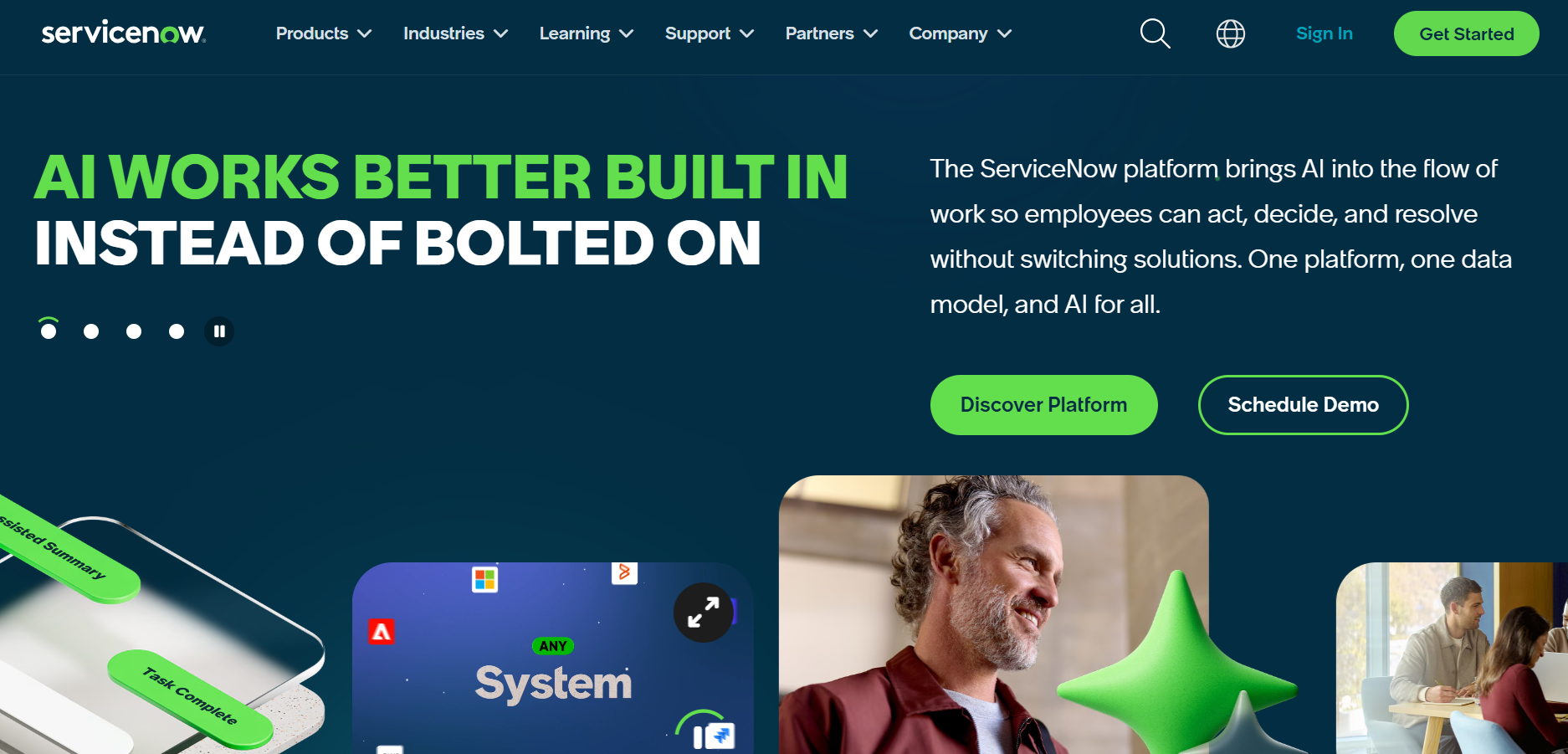
However, discussions on Reddit and other tech communities show a growing trend: “Is ServiceNow a good move right now?”
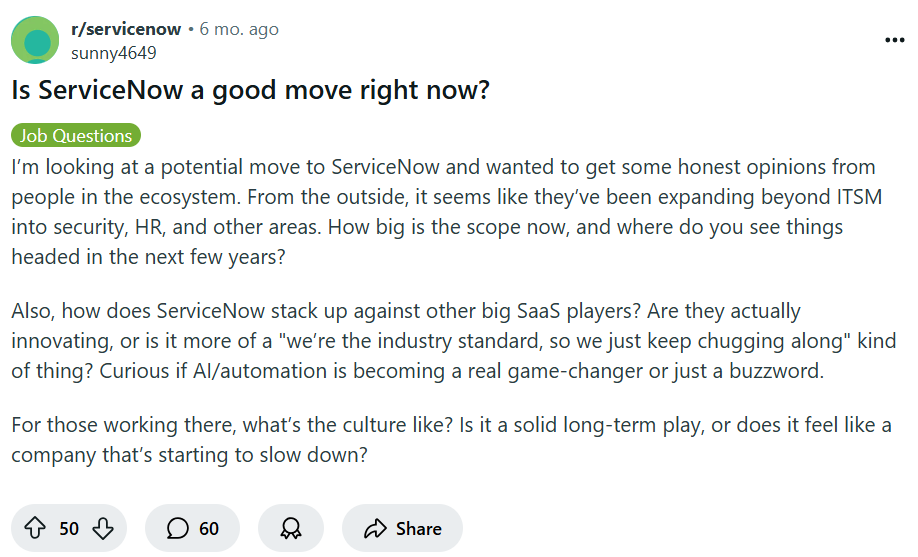
User feedback highlights several recurring concerns:
1. Powerful but expensive
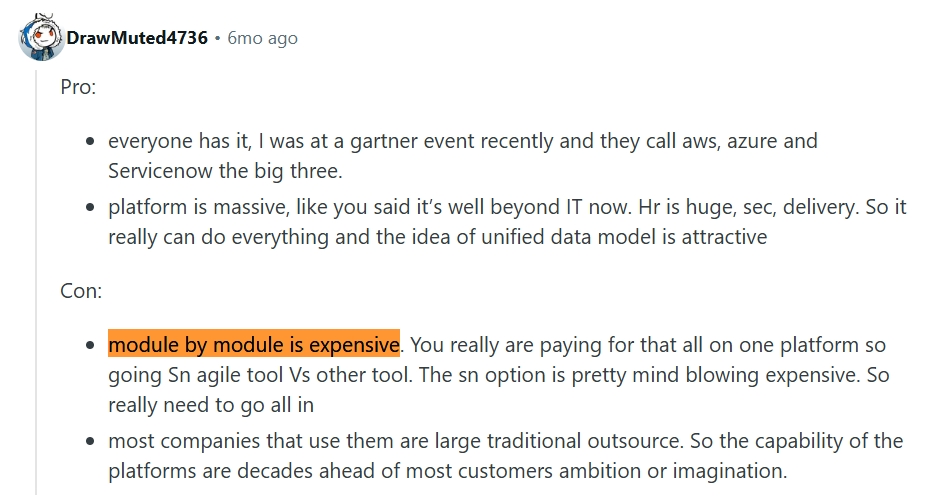
2. Customized to hell

3. Feature mismatch
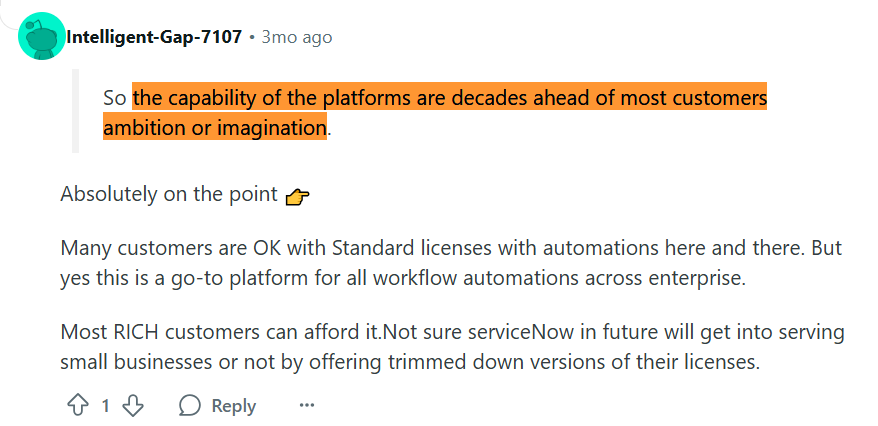
Because of these challenges, more and more companies are exploring open-source alternatives — platforms that offer lower costs, greater flexibility, and self-hosted deployment options.
In this guide, we’ve selected 5 of the best open-source ServiceNow alternatives, divided into three categories to help you make the right choice based on your business needs:
- No-Code / Low-Code Platforms → Best for building fully customized ITSM systems
- Full-Featured ITSM Platforms → Closest in functionality to ServiceNow
- Lightweight Ticketing & Helpdesk Systems → Simple, fast to deploy, and highly efficient
💬 Hey, you’re reading the NocoBase blog. NocoBase is the most extensible AI-powered no-code/low-code development platform for building enterprise applications, internal tools, and all kinds of systems. It’s fully self-hosted, plugin-based, and developer-friendly. → Explore NocoBase on GitHub
💡 Looking for more open-source alternatives?
We’ve also covered Firebase, AppSheet, OutSystems, and Salesforce:
- 6 Open-Source Firebase Alternatives for Self-Hosting and Data Control
- The Best Open-Source Alternatives to AppSheet in 2025
- Why Open-Source Alternatives Are Replacing OutSystems in 2025?
- 4 Powerful Open Source Alternatives to Salesforce (With Cost Comparison You’ll Love)
5 Best Open-Source ServiceNow Alternatives
| Tool | Type | Key Highlights | Best For |
|---|---|---|---|
| NocoBase | Low-Code / No-Code Platform | Highly customizable, plugin-based architecture, open-source, powerful workflow automation | Teams looking to quickly build ticketing systems, approval workflows, or business apps on an open-source platform |
| Budibase | Low-Code Platform | Open-source, supports external data connections, auto-generated UI, free SSO, self-hosting | IT teams building custom ITSM tools, asset management systems, and approval workflows |
| GLPI | Full-Featured ITSM | Ticketing management, CMDB, asset management, mature plugin ecosystem | Medium to large enterprises, especially those focusing on IT asset and configuration management |
| Zammad | Lightweight Ticketing System | Multi-channel support, advanced SLA features, strong API extensibility | SMEs and SaaS startups building customer support or operations platforms |
| EspoCRM | CRM + Ticketing System | Integrated CRM and service ticketing, customizable, workflow automation | Businesses needing unified management of CRM and service tickets |
Pricing Overview: ServiceNow vs. Open-Source Alternatives
ServiceNow follows a SaaS subscription model with pricing based on modules, user roles, and contract terms:
- Module-based pricing → ITSM, ITOM, HR, and CSM are billed separately.
- User-type pricing → “Full Users” and “Light Users” are priced differently.
- Annual contracts → Minimum one-year commitment, pricing varies based on modules and organization size.
Estimated cost range: $50,000 – $500,000 per year, depending on licenses, features, and configurations.
👉 See details: https://www.servicenow.com/upgrade-schedules.html
| Tool | Version | Estimated Annual Cost for 10-Person Team | Estimated Annual Cost for 50-Person Team | Estimated Annual Cost for 100-Person Team |
|---|---|---|---|---|
| NocoBase | Standard | $800 | $800 | $800 |
| NocoBase | Professional | $8,000 | $8,000 | $8,000 |
| Budibase | Premium | $1680 (2 Creator + 8 Users) | $5,700 (5 Creator + 45 Users) | $11,400 (10 Creator + 90 Users) |
| GLPI | On-premises | €1,200 | €3,600 | €12,000 |
| Zammad | Self-hosted | €2,999 | €5,999 | €9,999 |
| EspoCRM | Basic | $1,800 | $9,000 | $18,000 |
| EspoCRM | Enterprise | $3,000 | $15,000 | $30,000 |
| EspoCRM | Ultimate | $8,280 | $41,400 | $82,800 |
Category 1: No-Code / Low-Code Platforms
1. NocoBase
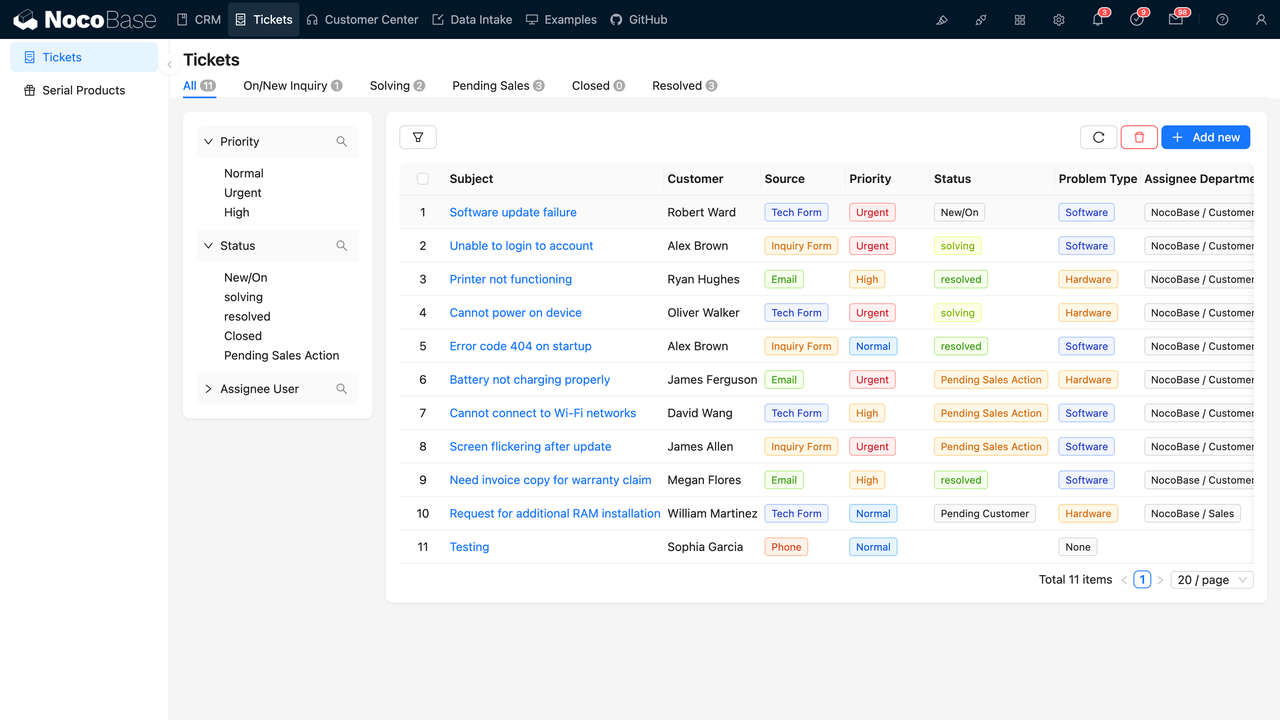
Overview
- GitHub Star: 21.3k
- GitHub: https://github.com/nocobase/nocobase
- Website: https://www.nocobase.com/
NocoBase is a highly flexible, open-source AI no-code / low-code tool that helps developers quickly create and manage applications through an intuitive user interface and drag-and-drop functionality.
Key Features
- Plugin-Based Architecture: Every module — from data modeling to role-based access control, workflows, and reporting — is packaged as a plugin. Teams can install only what they need or build custom plugins for maximum extensibility.
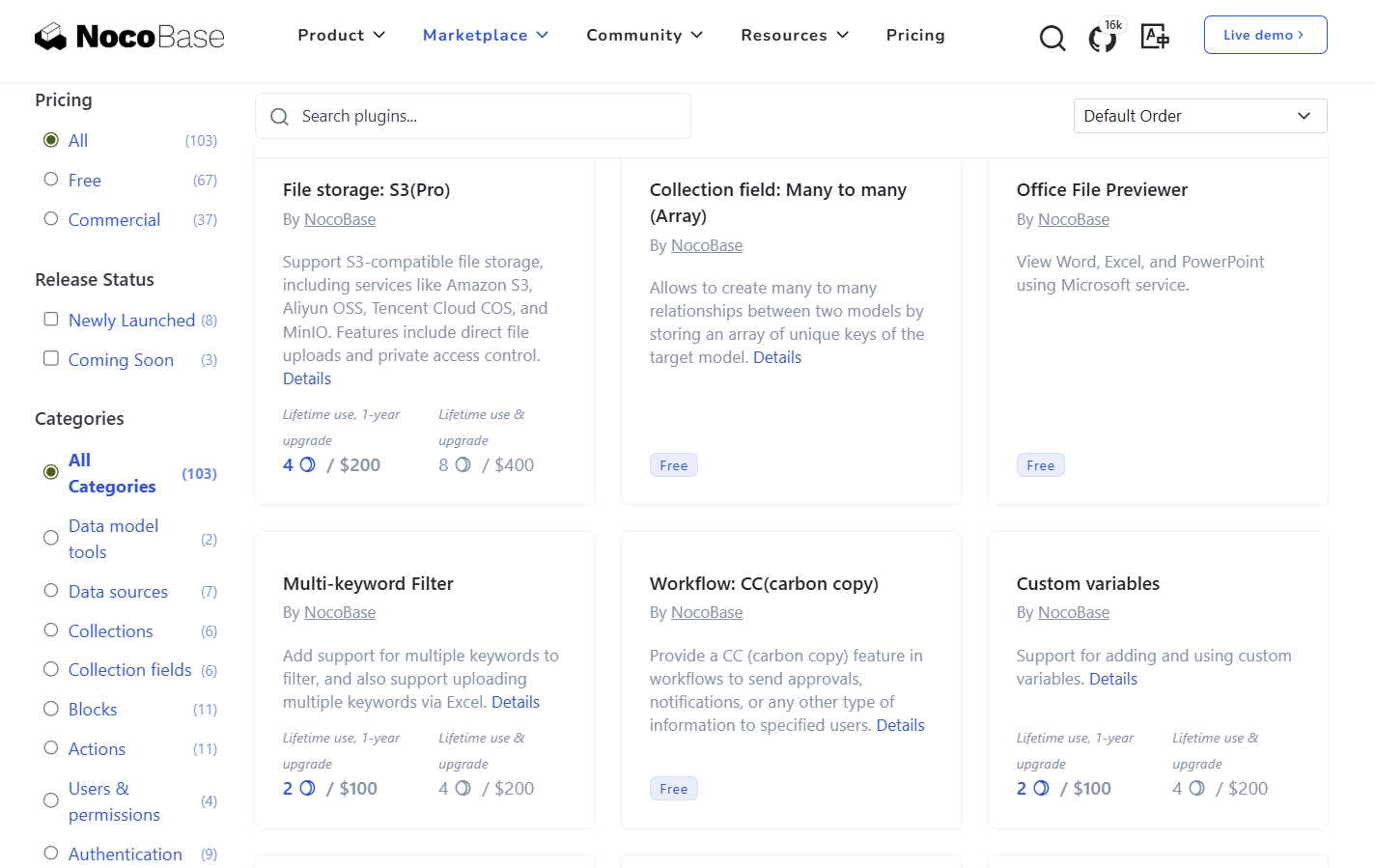
- Data-Model Driven: Offers a powerful visual data modeling interface for defining tables, fields, relationships, and permissions. Since all features run on top of the data model, NocoBase adapts seamlessly to scenarios like asset management, CMDB, or ticketing systems.
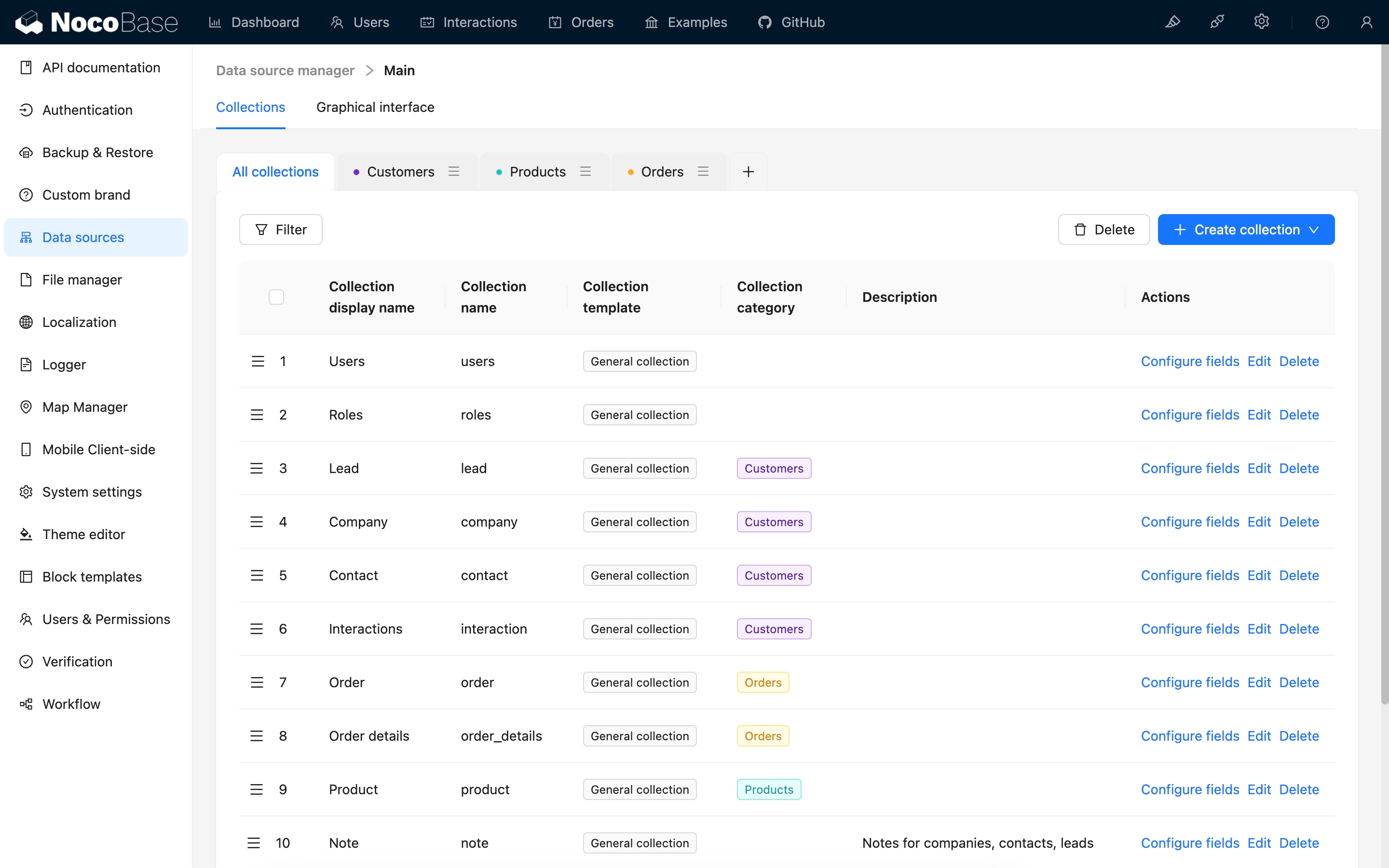
- Built-In Workflow Automation: Includes a low-code process orchestration engine with conditions, approvals, API integrations, and cross-system triggers. You can automate SLA escalations, ticket routing, and inter-department workflows without heavy coding.
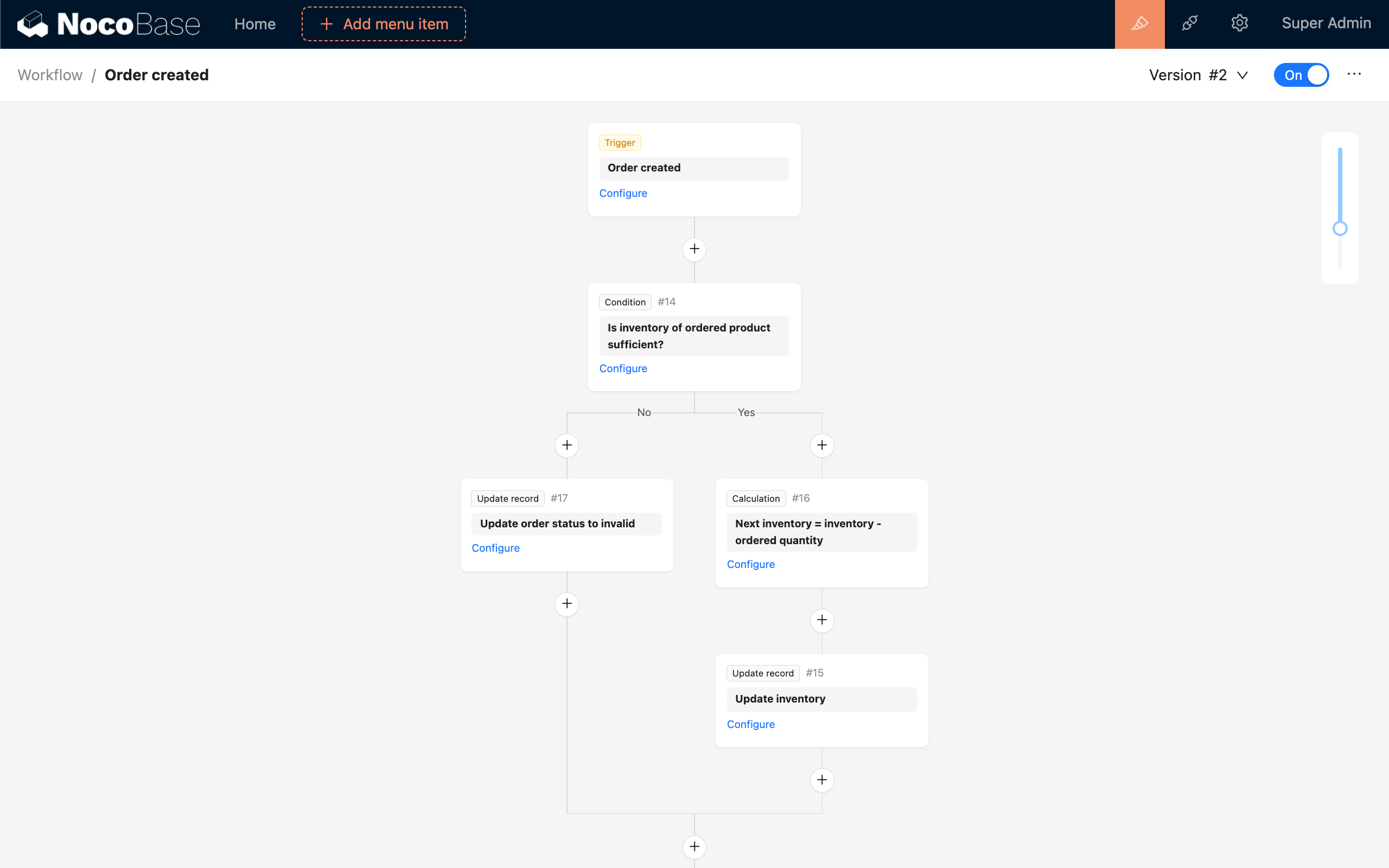
- AI employees embedded in the system: Seamlessly integrate AI capabilities into user interfaces, business workflows, and data contexts, enabling AI to be practically applied in real enterprise scenarios.
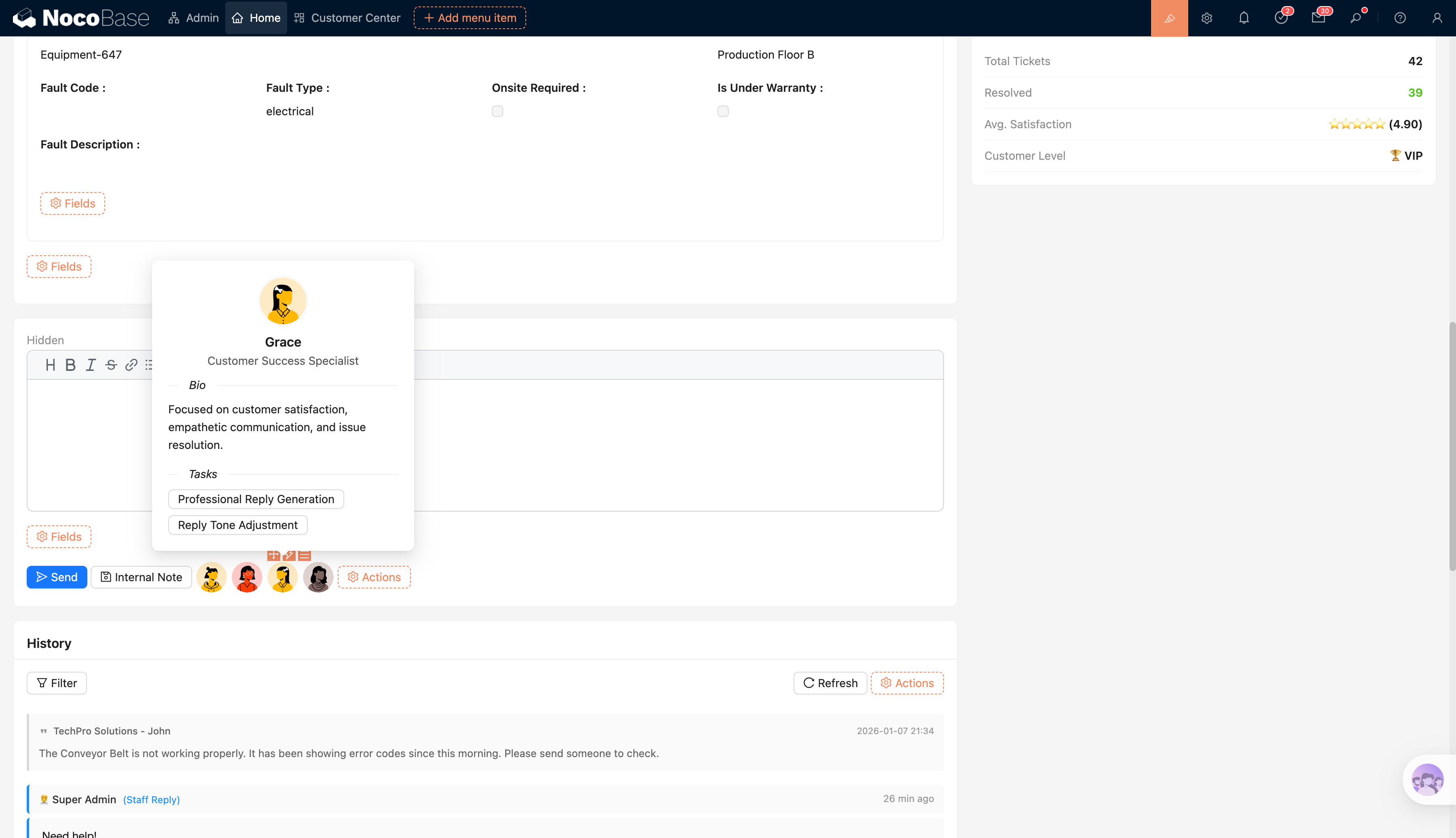
Use Cases
- ITSM ticketing system with custom SLAs and approval flows
- Asset and configuration management integrated with CMDB
- Cross-department workflows connecting HR, finance, and IT
Compared to ServiceNow
- Greater flexibility → Fully open-source, self-hosted, unlimited plugin extensions
- Lower cost → No recurring subscription fees, ideal for startups and SMEs
- Faster deployment → Visual modeling reduces setup complexity
2. Budibase
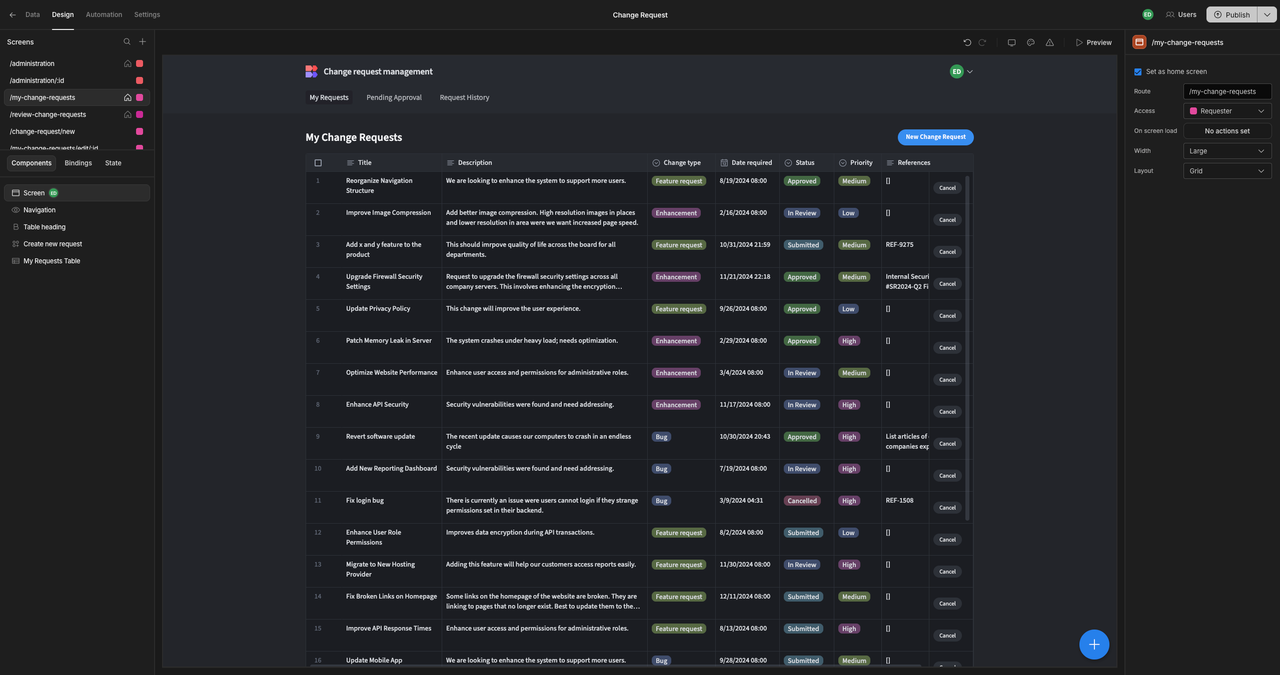
Overview
- GitHub Star: 26.4k
- GitHub: https://github.com/Budibase/budibase
- Website: https://budibase.com/
Budibase is another open-source low-code platform focused on rapidly creating internal tools, process automation, and data-driven applications. It’s well-suited for ITSM teams that need fast iteration and high customization.
Key Features
- Low-Code Form & App Builder: Build applications like ticketing systems, approval forms, knowledge bases, and dashboards with a drag-and-drop interface. Supports custom UI components, fields, and business logic for full flexibility.
- Automation Engine & Triggers: Includes a built-in automation system that supports event-based, time-based, and condition-based triggers. Connect to external APIs and databases to sync data across systems seamlessly.
- Multi-Source Data Integration: Natively integrates with PostgreSQL, MySQL, MongoDB, REST APIs, and more, allowing teams to centralize ServiceNow data alongside other business data in Budibase apps.
Use Cases
- Build a custom ITSM ticketing system with SLA tracking and approval workflows
- Develop internal tools for HR, finance, procurement, and other departments
- Create data visualization dashboards with real-time reporting
Compared to ServiceNow
- Lightweight & efficient → Deploy apps without complex setup
- More flexible → Visual builder plus custom code for advanced requirements
- Cost-effective → Open-source, self-hosted, no expensive subscription fees
Category 2: Full-Featured ITSM Platforms
1. GLPI
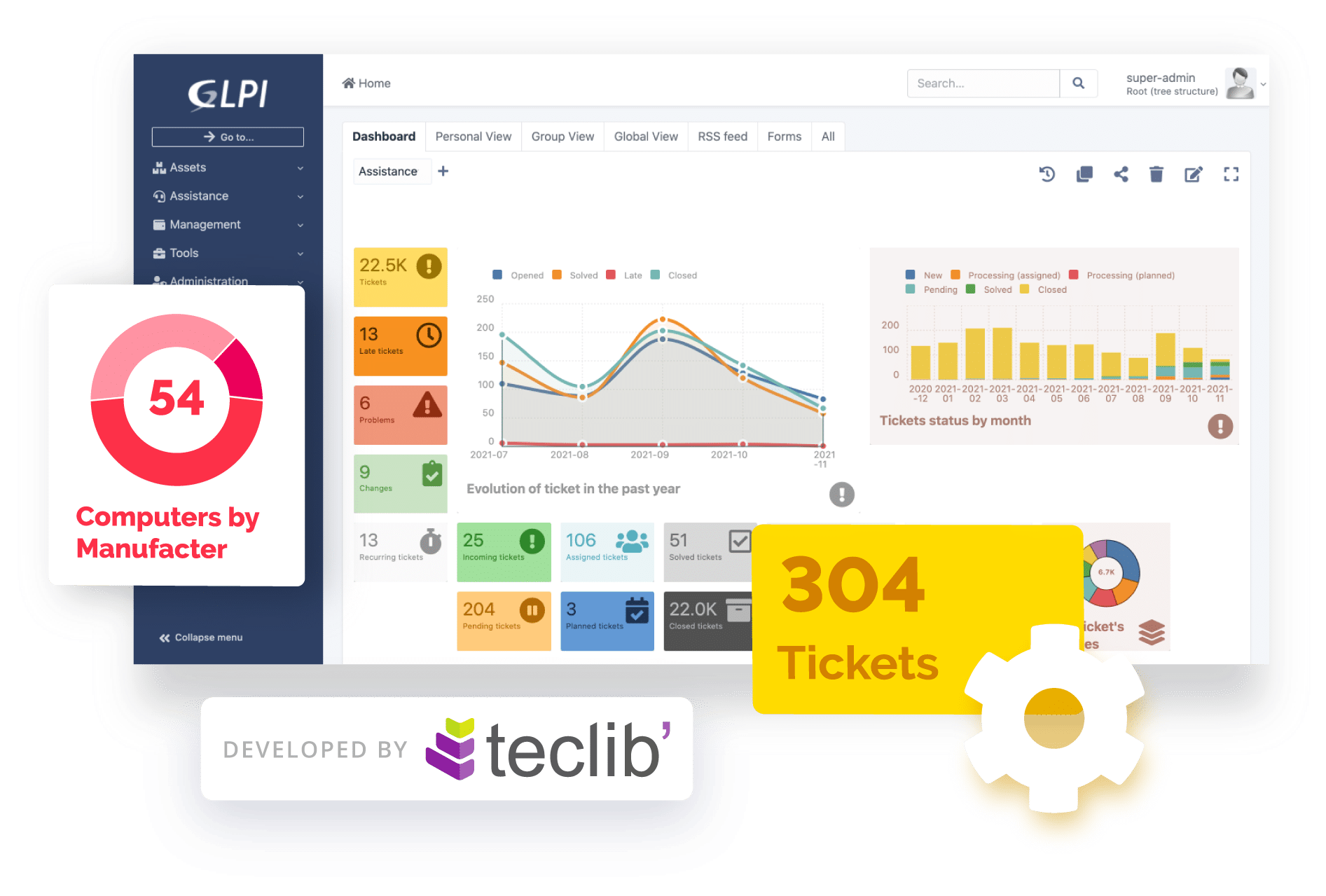
- GitHub Star: 5.1k
- GitHub: https://github.com/glpi-project/glpi
- Website: https://glpi-project.org/
Overview
GLPI is an open-source ITSM platform designed for IT asset management, ticketing, and service management. It offers a comprehensive set of features suitable for mid- to large-sized enterprises seeking a self-managed IT service environment.
Key Features
- Multi-Channel Ticketing: Consolidate email, chat, phone, and social media requests into a single interface for seamless ticket management.
- Automation & SLA Management: Automate ticket assignments, set priorities, and track SLAs to improve response times.
- Reporting & Analytics: Offers visual dashboards and reports to track customer requests, resolution times, and team performance.
Use Cases
- Enterprise ITSM platforms for ticketing and SLA management
- Asset management and CMDB for hardware, software, and network devices
- IT service analytics with real-time reporting and dashboards
Compared to ServiceNow
- Lower Cost → 100% open-source with no subscription fees
- Easy Deployment → Ideal for standard ITSM processes
- Focused Features → Prioritizes core ITSM capabilities without unnecessary complexity
Category 3: Lightweight Ticketing & Customer Support Systems
1. Zammad
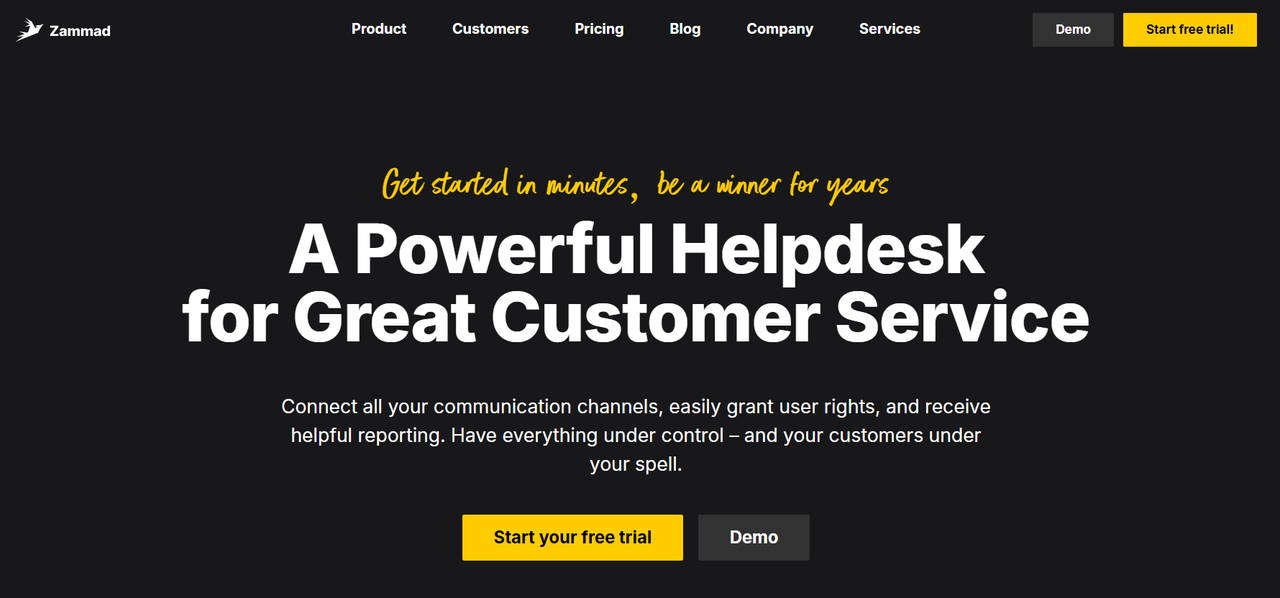
Overview
- GitHub Star: 5k
- GitHub: https://github.com/zammad/zammad
- Website: https://zammad.com/
Zammad is an open-source ticketing and customer support system built for efficient, real-time communication. It’s ideal for teams that need to handle multi-channel support effectively.
Key Features
- Multi-Channel Ticketing: Consolidate email, chat, phone, and social media requests into a single interface for seamless ticket management.
- Automation & SLA Management: Automate ticket assignments, set priorities, and track SLAs to improve response times.
- Reporting & Analytics: Offers visual dashboards and reports to track customer requests, resolution times, and team performance.
Use Cases
- Customer support centers handling multi-channel requests
- Automated ticket workflows with SLA tracking
- Performance analysis for support teams
Compared to ServiceNow
- Lightweight & Fast → Easy deployment for SMEs
- Better Multi-Channel Support → Enhances customer experience
- Cost-Effective → Open-source and self-hosted options available
💡 Read more: 6 Best Open-Source Ticketing Systems for 2025
2. EspoCRM
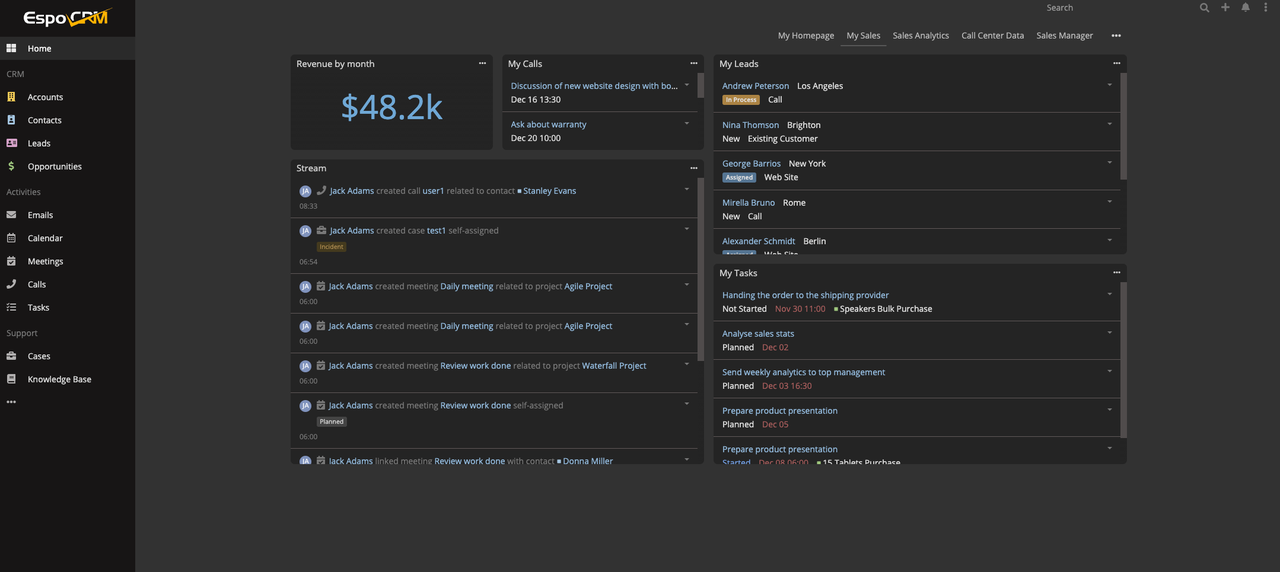
Overview
- GitHub Star: 2.4k
- GitHub: https://github.com/espocrm/espocrm
- Website: https://www.espocrm.com/
EspoCRM is an open-source customer relationship management system that integrates ticketing, project management, and process automation. It’s a great fit for businesses seeking a CRM and ITSM hybrid solution.
Key Features
- Customer & Ticket Management: Manage tickets with assignment, status tracking, and prioritization, fully integrated with CRM capabilities.
- Workflow Automation: Set up triggers and workflows to automate task assignments, notifications, and approvals.
- Reports & Dashboards: Includes visual reports and KPI monitoring to analyze sales, service performance, and project outcomes.
Use Cases
- Customer support and after-sales service
- Automated workflows for ticketing and processes
- Integrated CRM + ITSM applications for growing businesses
Compared to ServiceNow
- Built-In CRM → Manage customer relationships alongside ticketing
- Flexible & Open-Source → Self-hosting and full customization supported
- Lightweight Deployment → Easy to set up for small and mid-sized teams
Final Thoughts
Compared to ServiceNow, open-source alternatives offer significant advantages in cost, flexibility, and customization.
NocoBase, Budibase, GLPI, Zammad, and EspoCRM each address different needs, covering use cases from ITSM and ticketing to customer relationship management.
Choosing the right tool based on your team size, IT maturity, and business requirements can help you build an efficient, scalable, and fully customized service management platform—without the high costs of enterprise software.
🚀 Ready to explore?
Try one of these open-source solutions today and start building your own ServiceNow alternative tailored to your business.
Related reading:
- 6 Open-Source Firebase Alternatives for Self-Hosting and Data Control
- The Best Open-Source Alternatives to AppSheet in 2025
- Why Open-Source Alternatives Are Replacing OutSystems in 2025?
- 4 Powerful Open Source Alternatives to Salesforce (With Cost Comparison You’ll Love)
- The Best Open-Source Alternatives to Retool In 2025